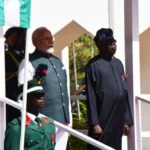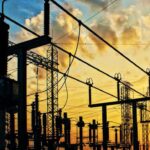On the sixtieth anniversary of Nigeria’s freedom from British colonial rule when we should reflect deeply on the journey so far into our nationhood and what we need to do strengthen ourselves for the journey ahead, some groups are however wishing and plotting the death of this country that has sustained us all through the years.
Their argument is based on the outworn shibboleth that Nigeria was a forcible creation of unwilling and incompatible peoples by the British deliberately skewed as it were in favour of a poor and backward northern Nigeria at the detriment of a rich, prosperous and progressive southern Nigeria.
So as the narrative goes further, having come this far with ‘’this Lugardian contraption’’ which appears not to be working, it was better to dissolve the union and let the incompatible components go their own ways in furtherance of the principle of self-determination as enshrined in the United Nation’s charter.
This has been the rallying cry of some groups in south east of the country in their quest for a ‘’Republic of Biafra’’ of indeterminate and unconvincing boundaries whose quixotic leader Nnamdi Kanu and his Indigenous Peoples of Biafra (IPOB) is driving from a drab council flat in the run down London district of Peckham.
He hopes to achieve this through foul mouthed rants at leaders of the ‘’zoo’’ as he calls Nigeria sparing not even the present elected and appointed leaders from the area of his dream ‘’Biafra Republic’’.
Of late he has been joined by another agitation for a mythical ‘’Oduduwa Republic’’ encompassing the south west region of Nigeria also of indeterminate and unconvincing boundaries, led by an octogenarian former history professor, Banji Akintoye, and his Yoruba World Congress (YWC).
Although both agitations seem to enjoy a lot of publicity from an uncritical but vocal section of the media more perhaps for the sensation they create and the circulation and sales they generate, there are however some salient issues these agitators seem either to have glossed over or are ignorant of in pursuit of their causes.
These are the legal, diplomatic and military imperatives of their agitations.
When the British came to these shores on their mission to conquer and colonise, the entities they met were not recognised by the existing laws of the time.
And in any case those that claimed any rights to statehood at the time had signed treaties of ‘’protection’’ with the British which in practical terms ousted their sovereign rights.
The mark of a state was to legally prove its existence by functioning administrative structures and institutions, recognised boundaries and a credible military to defend the state.
There were no such states in the area which came to be known as Nigeria.
Any group or part of Nigeria in our present age that seeks to pull out of the country on the basis of a state or entity that purported to exist before the coming of the British must prove the legality of the existence of that state in history.
To the best of our knowledge, there was no central Igbo political entity existing before the coming of the British.
The Aro Igbo sub group which were the nearest thing to such in Igboland were mainly itinerant merchants who never came round to developing any centralising administrative structures and institutions.
And in the southwest, the Oyo Empire had long disintegrated before the coming of the British.
Indeed the British arrived to find the entire southwest engulfed in an internecine warfare pitting Ibadan the successor state to the Oyo Empire and the other Yoruba communities, which had raged for sixteen years, and which they intervened to stop in September 1866.
So on which pre-colonial entities will the two secessionist groups establish their quest to restore as reason for their cause?
If they cannot prove the existence of these entities both in historical and legal terms, it stands to reason that they would find it difficult to gain any diplomatic mileage for their cause.
Which world power or serious state will recognise and support an agitation that has no concrete historical and legal basis?
The agitators should not take it to heart that some fringe groups and individuals in some western countries have purported to stand by them. But this is for the optics only.
When it matters, those with the responsibility to decide will be guided by cold, hard reality and interests, not by emotions and sentiments.
At some point, the secessionists may want explore the military option.
In this regard, they will soon experience what other separatist movements like the ‘’Biafra’’ of Odumegwu Ojukwu, the Irish Republican Army (IRA) in Northern Ireland, ETA Basques separatists in Spain and Jonas Savimbi’s UNITA in Angola went through for years and came out with nothing tangible for their years of self-destructive armed agitation for separation.
Our separatists also cite the principle of self-determination for their agitations as well as the argument that the amalgamation of 1914 which fused the northern and southern protectorates of Nigeria into one colony had duration of hundred years, implying that it would have ended in 2014.
One of the major determinants for the validity of claims for self-determination requires agitators to establish that they have been denied democratic representation.
On this score we all know our secessionists will be hard put to convince the International community that they have a case worthy of attention.
The 1914 amalgamation was not a treaty between Britain and any existing entity or entities in Nigeria; it was an administrative measure for the convenience of the colonial power over his long conquered subjects that did not require the latter’s consent or objections.
In any case with Independence in 1960 and republican status in 1963, all issues relating to our colonial status were deemed to have lapsed.
We became a new country, whose boundaries, statutes and symbols were recognised by International law.
The time to have opted out of the future Nigeria was during the pre-Independence talks in which all parts had the opportunity to make their case.
Having signed the instruments of the new Independent state of Nigeria, all the regions, provinces and the peoples etc of pre-Independent Nigeria became subsumed under the new sovereign state of Nigeria which was vested with the power to exercise its full rights over the new state constituting about one million square miles and multitude of ethnic groups.
But does this mean that Nigeria as constituted is cast in stone and cannot be challenged by those who feel aggrieved about developments in the country?

 Join Daily Trust WhatsApp Community For Quick Access To News and Happenings Around You.
Join Daily Trust WhatsApp Community For Quick Access To News and Happenings Around You.

